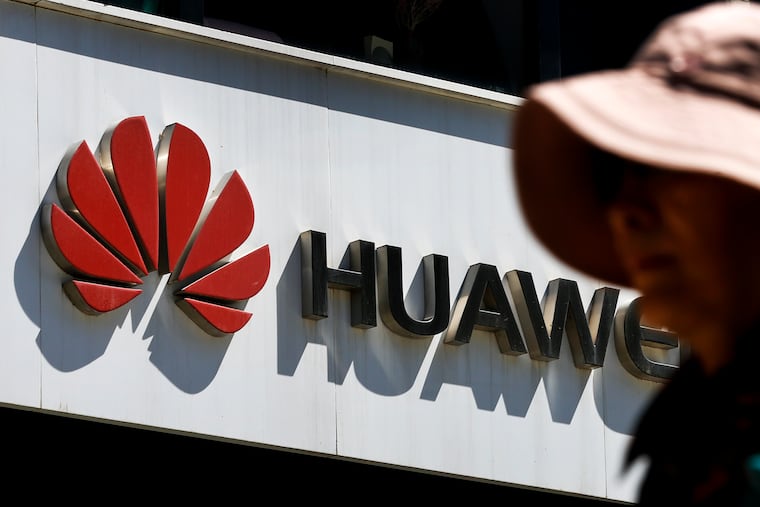Huawei ban threatens U.S. national security, tech companies warn Trump administration
U.S. technology companies have told the Commerce Department that the Trump administration's ban on selling to the Chinese tech giant Huawei could significantly harm their bottom lines and might damage their ability to develop new technological innovations, including those needed by the U.S. military.

U.S. technology companies have told the Commerce Department that the Trump administration's ban on selling to the Chinese tech giant Huawei could significantly harm their bottom lines and might damage their ability to develop new technological innovations, including those needed by the U.S. military.
The companies are making the claims in applications for licenses that would let them do business with Huawei after the prohibition goes into effect in August, according to people familiar with the licensing process.
Huawei is the second largest cell phone maker in the world and a leading maker of telecommunications equipment crucial to the rollout of the next generation of wireless technology known as 5G. It is also the third largest buyer of U.S.-made computer chips, according the Semiconductor Industry Association.
The Trump administration placed Huawei on the Commerce Department's entity list in May for violating U.S. sanctions on Iran, prohibiting U.S.-based companies from doing business with it. It then granted a 90-day reprieve of the effective date to soften the blow to U.S. companies.
Under Department of Commerce rules, U.S. companies that want to continue to sell to Huawei must apply for licenses, and the chip makers and software providers who depend on Huawei as a customer are already beginning to argue why they should get one.
According to people briefed on the matter who asked not to be named because they feared going public might make it harder to obtain licenses, the companies, especially chip makers, have included detailed financial projections and other data in their applications showing the potential for significant harm.
Companies have argued that the ban already has harmed the outlook for U.S. chip makers by prompting Chinese companies to reduce their reliance on the United States and develop alternative suppliers outside the U.S.
Some chip makers have argued that the loss of revenue from Huawei and its affiliates could force them to cut back on research and development, slowing down the development process for new computer chips. That even could hurt U.S. military technology, they say, because the military relies on faster and more capable chips. Critical infrastructure, which also relies on computer chips, could become more vulnerable to failure and attacks, some companies have argued.
It's unclear whether the arguments have resonated with the Department of Commerce or the White House, where a final decision is likely to be made on the licenses. A rejection is the assumed response under Commerce Department rules.
Tech companies said they are treading carefully for fear that any critique of U.S. policy could offend the Trump administration and open them to possible retaliation.
U.S. companies have not always been allowed to apply for a license to sell to companies on the entity list, which was created to sanction foreign companies and people whose actions the government deemed threatening to U.S. national security or foreign policy interests. But the possibility was dreamed up in March, 2016, by Kevin Wolf, then the assistant secretary of state for export administration and now a partner in the law firm Akin Gump.
At the time, the Commerce Department's Bureau of Industry and Security was planning to place another Chinese company, ZTE, on the entity list, and Wolf was contemplating the many repercussions of such a move. On his commute into Washington from Arlington, Virginia one day, he decided it would be a good idea to give companies a workaround in the form of a license.
"I created it as a tool to accomplish what I wanted to accomplish on ZTE," he said.
At the time, ZTE was in negotiations with the U.S. government over selling products to Iran in violation of U.S. sanctions. Adding ZTE to the entity list was a way to put pressure on them in the negotiations, Wolf said, and he saw giving U.S. companies licenses to sell to ZTE despite the ban as a way to encourage further cooperation. The Trump administration lifted the ZTE ban last year after it agreed to pay a $1 billion penalty and restructure its management.
Whether the administration has a similar strategy for Huawei is unknown, as is whether Huawei and the administration are negotiating a settlement. Some have speculated that adding Huawei to the entity list was a tactic to increase pressure on the Chinese government in ongoing trade negotiations.
“The Chinese government has continually put Huawei on the table in trade talks,” said James Lewis, a senior vice president at the Center for Strategic and International Studies. “I think Huawei knows the only people who can save them when it comes to the U.S. is the Chinese government.”